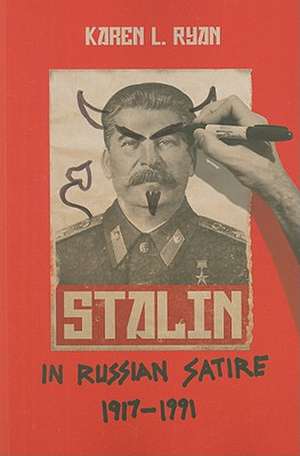Stalin in Russian Satire, 1917–1991
Autor Karen L. Ryanen Limba Engleză Paperback – 24 noi 2009
During Stalin’s lifetime the crimes of his regime were literally unspeakable. More than fifty years after his death, Russia is still coming to terms with Stalinism and the people’s own role in the abuses of the era. During the decades of official silence that preceded the advent of glasnost, Russian writers raised troubling questions about guilt, responsibility, and the possibility of absolution. Through the subtle vehicle of satire, they explored the roots and legacy of Stalinism in forms ranging from humorous mockery to vitriolic diatribe.
Examining works from the 1917 Revolution to the fall of the Soviet Union in 1991, Karen L. Ryan reveals how satirical treatments of Stalin often emphasize his otherness, distancing him from Russian culture. Some satirists portray Stalin as a madman. Others show him as feminized, animal-like, monstrous, or diabolical. Stalin has also appeared as the unquiet dead, a spirit that keeps returning to haunt the collective memory of the nation. While many writers seem anxious to exorcise Stalin from the body politic, for others he illuminates the self in disturbing ways. To what degree Stalin was and is “in us” is a central question of all these works. Although less visible than public trials, policy shifts, or statements of apology, Russian satire has subtly yet insistently participated in the protracted process of de-Stalinization.
Examining works from the 1917 Revolution to the fall of the Soviet Union in 1991, Karen L. Ryan reveals how satirical treatments of Stalin often emphasize his otherness, distancing him from Russian culture. Some satirists portray Stalin as a madman. Others show him as feminized, animal-like, monstrous, or diabolical. Stalin has also appeared as the unquiet dead, a spirit that keeps returning to haunt the collective memory of the nation. While many writers seem anxious to exorcise Stalin from the body politic, for others he illuminates the self in disturbing ways. To what degree Stalin was and is “in us” is a central question of all these works. Although less visible than public trials, policy shifts, or statements of apology, Russian satire has subtly yet insistently participated in the protracted process of de-Stalinization.
Preț: 168.22 lei
Nou
Puncte Express: 252
Preț estimativ în valută:
32.19€ • 33.49$ • 26.58£
32.19€ • 33.49$ • 26.58£
Carte disponibilă
Livrare economică 24 martie-07 aprilie
Preluare comenzi: 021 569.72.76
Specificații
ISBN-13: 9780299234447
ISBN-10: 0299234444
Pagini: 256
Dimensiuni: 152 x 229 x 18 mm
Greutate: 0.37 kg
Ediția:1
Editura: University of Wisconsin Press
Colecția University of Wisconsin Press
ISBN-10: 0299234444
Pagini: 256
Dimensiuni: 152 x 229 x 18 mm
Greutate: 0.37 kg
Ediția:1
Editura: University of Wisconsin Press
Colecția University of Wisconsin Press
Recenzii
“Ryan is unique in her focus on the methods and devices used for satiric distortion of Stalin’s image. This angle allows her to examine Soviet/Russian national complexes rather than Stalin as a historical figure.”—Mark Lipovetsky, author of Russian Postmodernist Fiction: Dialogue with Chaos
“Ryan is to be congratulated on delivering a thoughtful and thought-provoking examination of the role of satire in the process of cultural de-Stalinization even as it extends into the twenty-first century. I highly recommend this book for advanced undergraduate and graduate-level courses in Russian literature and culture, as well as for specialists in the field.”—Kevin J. McKenna, Russian Review
Notă biografică
Karen L. Ryan is professor of Slavic languages and literatures at the University of Virginia. She is author of Contemporary Russian Satire: A Genre Study.
Cuprins
Acknowledgments
Introduction
1 The Insanity Defense
2 A Bestiary of Stalins
3 Stalin in a Dress
4 The Monster Lurks Within
5 The Devil Made Us Do It
6 The Corpse and the Revenant
Conclusion
Notes
Bibliography
Index
Introduction
1 The Insanity Defense
2 A Bestiary of Stalins
3 Stalin in a Dress
4 The Monster Lurks Within
5 The Devil Made Us Do It
6 The Corpse and the Revenant
Conclusion
Notes
Bibliography
Index
Descriere
During Stalin’s lifetime the crimes of his regime were literally unspeakable. More than fifty years after his death, Russia is still coming to terms with Stalinism and the people’s own role in the abuses of the era. During the decades of official silence that preceded the advent of glasnost, Russian writers raised troubling questions about guilt, responsibility, and the possibility of absolution. Through the subtle vehicle of satire, they explored the roots and legacy of Stalinism in forms ranging from humorous mockery to vitriolic diatribe.
Examining works from the 1917 Revolution to the fall of the Soviet Union in 1991, Karen L. Ryan reveals how satirical treatments of Stalin often emphasize his otherness, distancing him from Russian culture. Some satirists portray Stalin as a madman. Others show him as feminized, animal-like, monstrous, or diabolical. Stalin has also appeared as the unquiet dead, a spirit that keeps returning to haunt the collective memory of the nation. While many writers seem anxious to exorcise Stalin from the body politic, for others he illuminates the self in disturbing ways. To what degree Stalin was and is “in us” is a central question of all these works. Although less visible than public trials, policy shifts, or statements of apology, Russian satire has subtly yet insistently participated in the protracted process of de-Stalinization.
Examining works from the 1917 Revolution to the fall of the Soviet Union in 1991, Karen L. Ryan reveals how satirical treatments of Stalin often emphasize his otherness, distancing him from Russian culture. Some satirists portray Stalin as a madman. Others show him as feminized, animal-like, monstrous, or diabolical. Stalin has also appeared as the unquiet dead, a spirit that keeps returning to haunt the collective memory of the nation. While many writers seem anxious to exorcise Stalin from the body politic, for others he illuminates the self in disturbing ways. To what degree Stalin was and is “in us” is a central question of all these works. Although less visible than public trials, policy shifts, or statements of apology, Russian satire has subtly yet insistently participated in the protracted process of de-Stalinization.










